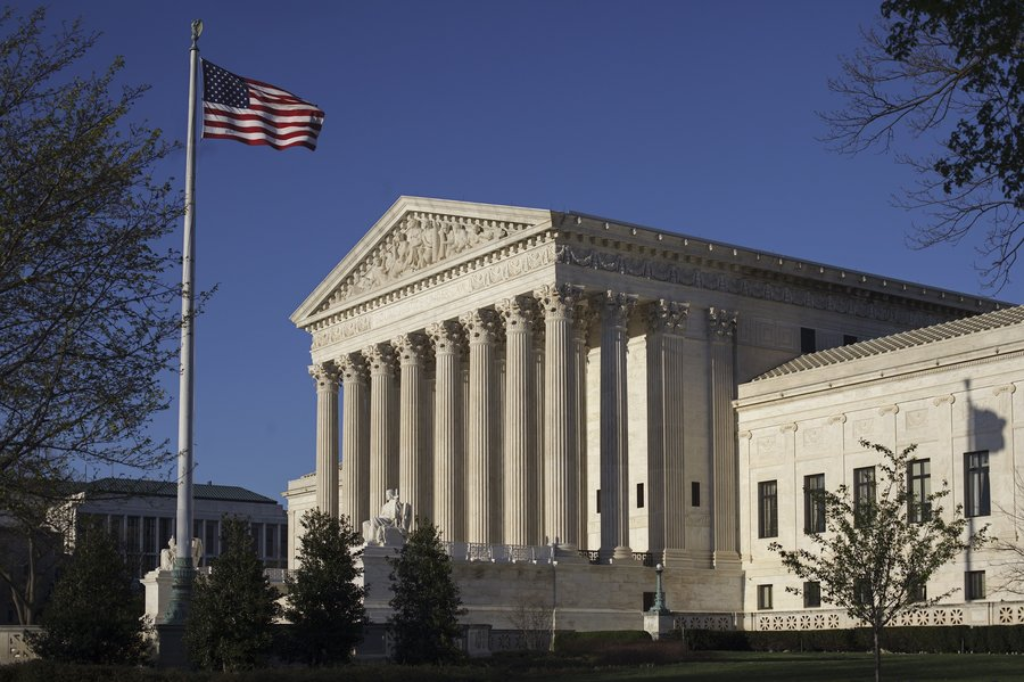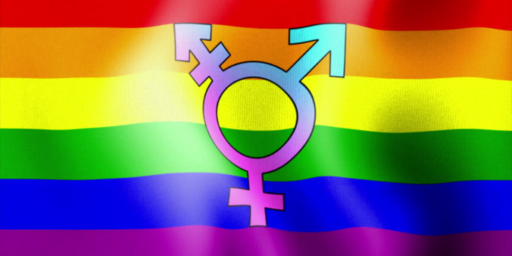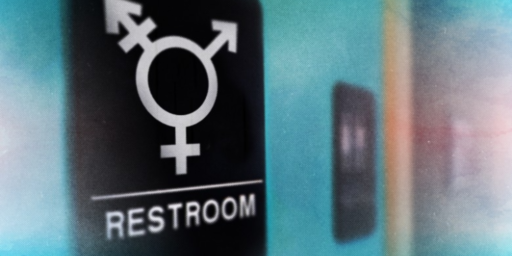Trans-friendly Supreme Court
The nation's highest court has gone all woke.

AP (“Unanimous Supreme Court gives transgender woman from Guatemala new chance to fight deportation“):
The Supreme Court ruled Thursday in favor of a transgender Guatemalan woman who is fighting deportation on the grounds that she would face persecution if returned to her native country.
The court’s unanimous decision in favor of Estrella Santos-Zacaria gives her another chance to argue that immigration officials were wrong to reject her bid to remain in the United States.
Lawyers for Santos-Zacaria, now in her mid-30s, said she first fled to the United States after being raped as a young teenager and threatened with death because of her gender identity in a country that has targeted the LGBTQ community.
But a U.S. immigration judge found that she did not make a strong enough case that she would face persecution if sent back to Guatemala.
The issue at the Supreme Court was more technical, whether federal immigration law was flexible enough to allow her another day in court. The 5th U.S. Circuit Court of Appeals had ruled against her on that point, but other appellate courts had ruled in favor of immigrants on the same issue.
The Supreme Court ruled in an opinion by Justice Ketanji Brown Jackson that the 5th Circuit was wrong.
After leaving Guatemala as a teenager, Santos-Zacaria had once before made it to the United States, but her stay was brief and she was deported in 2008, Jackson wrote.
Ten years later, she again entered the U.S. and was quickly taken into custody by immigration authorities.
Santos-Zacaria had testified that she was raped by a neighbor in the small town in which she was born and that townspeople said they would kill her because of her gender identity and her attraction to men.
She spent most of her time between 2008 and 2018 in Mexico, but decided to try to return to the U.S. after a Mexican gang also raped and assaulted her.
The State Department has found that Guatemala has done little to protect LGBTQ people and that transgender women are subject to frequent threats of violence.
I continue to be frustrated by the notion that people from anywhere in the Western hemisphere who can reach U.S. borders are eligible for asylum here rather than being required to apply in the first safe country. But I suspect Mexico isn’t much more hospitable to transwomen than Guatemala.
Regardless, what’s remarkable about the ruling isn’t so much a ruling on a technical matter but the language used in the opinions.
The Independent (“SCOTUS makes landmark decision recognising transgender person’s pronouns“):
The US Supreme Court made headlines this week for a ruling written by Justice Ketanji Brown Jackson that uses the correct pronouns and name for a transgender woman.
With Wednesday’s ruling, the court removed a procedural barrier for a non-US citizen to appeal a denial of protection from removal decision. It was a legal victory for Estrella Santos-Zacaria, a migrant from Guatemala who reached the US, fleeing persecution on the basis of her gender and sexual orientation and is seeking to stay in the country.
Throughout the opinion, which was joined by the court’s three other liberal justices, including Chief Justice John Roberts, Justice Brett Kavanaugh and Justice Amy Coney Barrett, Ms Jackson uses “she” and Ms Santos-Zacaria’s pronouns to refer to her, even though she was assigned male at birth. Ms Jackson also uses Ms Santos-Zacaria’s chosen name instead of her dead name.
Justice Samuel Alito wrote a concurring opinion that did not misgender or dead name Ms Santos-Zacaria, which embattled Justice Clarence Thomas joined.
Legal scholars and observers of the court noted that not only did the opinion correctly gender Ms Santos-Zacaria, but also that it used more humanising language for non-citizens than past opinions have.
“The Court reads the statutory word “alien” to mean a non-citizen (in a footnote),” former US attorney Joyce Alene wrote on Twitter. “Non-citizen, not illegal alien or similar dehumanising term. 7 justices signed on to Jackson’s decision in full & the concurrences don’t mention it. This is huge progress on both fronts.”
The court’s ruling struck some as particularly meaningful, given that it comes from a majority-conservative body in the midst of a wave of anti-transgender bills in state legislatures. There have already been more anti-LGBT+ bills introduced in state legislatures this year than in any other year in American history.
This is indeed noteworthy (although, oddly, SCOTUSBlog doesn’t have a write-up). The technical merits of the ruling aside—and all nine Justices agreed with the holding—we have the Chief Justice plus Gorsuch and Kavanagh signing off on Jackson’s language. The Alito concurrence is a single paragraph on a narrow technical matter and does not mention, much less gender, Santos-Zacaria.
Still, it’s not new. Looking back at the June 2020 rulings in Bostock v. Clayton County, to which I objected as legislating from the bench, Justice Gorsuch’s opinion was similarly respectful to the late Aimee Stephens, referring to her by that name and her preferred gender throughout the opinion, despite the fact that she was hired while presenting as Anthony Stephens and was fired as a result of the gender transition.






“Throughout the opinion, which was joined by the court’s three other liberal justices, including Chief Justice John Roberts, Justice Brett Kavanaugh and Justice Amy Coney Barrett”
I don’t think that word means what they think it does.
@Moosebreath: I had the same thought but it’s clearly just fast writing combined with no editor. It should have read “joined by the court’s three other liberal justices as well as Chief Justice John Roberts, Justice Brett Kavanaugh and Justice Amy Coney Barrett.”
@Moosebreath:
It should read “as well as” rather than “including.”
Could it be, that the SC is adopting a conservative position that people should be free to live their lives and that the state should respect that?
@Sleeping Dog: That’s probably more libertarian than conservative. Clearly, though, Gorsuch is there and Roberts seems to be. I’d be shocked if Alito and Thomas were.
I was surprised by this until I realized that in the case of my daughter, she went before a court to get a name and gender change from the State of California. Her status has the force of law, not that that would stop certain people from harassing her.
This may not currently be the case with Ms. Santos-Zacaria, but it could be.
The Court did something normal and decent and that’s being treated as newsworthy. Which it kinda is.
@James Joyner: @CSK:
Even if one rewrites it that way, it is lumping Gorsuch with the liberal justices, which still doesn’t fit.
@gVOR08: I don’t know that this is yet “normal” outside fairly limited circles. A passel of states are actively passing anti-trans legislation.
@Jay L Gischer:
One of the things that’s going to increasingly become an issue is that trans people’s birth certificates are essentially being held hostage by whatever state they happened to be born in, so even if someone born in, say, Oklahoma later moves to Washington, they’re unable to update the gender marker on their birth record.
They can still get their IDs changed, but then that creates additional issues with Real ID when the gender markers on the records don’t match up.